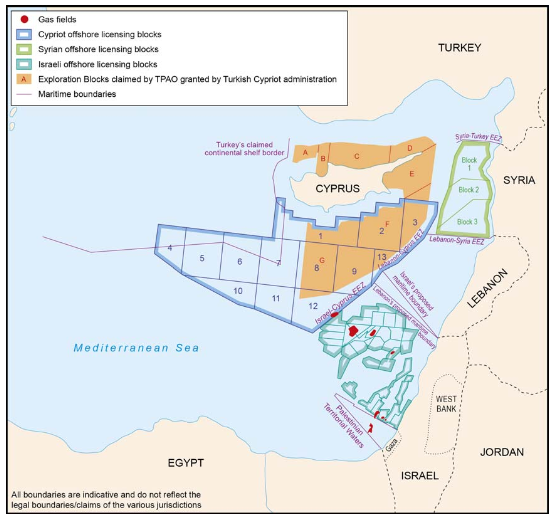

Floros Flouros Dr. Athanasios Dagoumas
Abstract
The discovery of HydroCarbons (HxCY) by Eastern Mediterranean countries is shaping a new environment for economic development in the region. The exploitation of energy resources re-affirms the importance of the long-standing and vexing diplomatic dispute among Cyprus and Turkey, creating uncertainties over improving their foreign relationships. The paper develops a conceptual framework, implements a detailed stakeholder’s analysis which shows that there are many factors involved and identifies the Critical Success Factors that would affect positively Cyprus-Turkey relations in the case of HxCY exploration in Cyprus’ EEZ. The qualitative research took place for a 3-months period in mid-2015 before the discovery of the Zohr gas field in Egypt. Based on the finding of the research, the continuation of the HxCY exploration in Cyprus’ EEZ strengthen its position and it gives a competitive advantage to Cyprus against Turkey; it provides credit to Cyprus’s efforts for national security and for this reason, several steps and actions are proposed to Cyprus in order to maximize any profits and increase its advantage against Turkey in the near/mid-term period.
Keywords: Energy Resources, Eastern Mediterranean, Cyprus, Turkey, EEZ, Critical Success Factors, Stakeholders, Energy Security
1. Introduction
In this study, the importance of HydroCarbon (HxCY) exploration in Exclusive Economic Zones (EEZ) and most particularly its implication on the involved countries is examined. Moreover, it is well known that Cyprus has been in conflict and confrontation with Turkey during the last decades. It will be argued that the continuation of the HxCY exploration from Cyprus inside its EEZ will strengthen its position with regard to Turkey which means that it will give to the Cyprus Republic a competitive advantage versus Turkey.
The Critical Success Factors (CSF) that affect positively the Cyprus-Turkey relation in the case of HxCY exploration in Cyprus’ EEZ will be identified and then prioritized/ranked by importance/contribution to the examined relation. In addition, a list of export options for the Cypriot government is also considered and it will be investigated whether political or economic/financial factors should be taken into consideration for the choice of such export options.
2. Framework of analysis
2.1. Literature Review
The Eastern Mediterranean region has been facing challenges also related to the energy landscape. Since the economy is foreseen to grow further while at the same time the population of the region is expected to grow from 45.3 mill in 2010 to around 60 mill in 2030, energy demand should also increase significantly over the next years.
On the basis of the Exclusive Economic Law (Law no. 64(I) 2004 amended by 2014 Law), “Cyprus declared its EEZ, the outer limit of which shall not extend beyond 200 nautical miles from the baselines” from which “the breadth of territorial sea is measured in accordance with UNCLOS” [1].
In Table 1 short summary is presented regarding the agreements that Cyprus has concluded so far in the East Mediterranean region with its neighboring countries like Israel, Egypt, and Lebanon but not with Greece, Syria and Turkey and the Palestinian Authority.
In Figure 1, the Maritime Boundaries in the Eastern Mediterranean region are presented [2].
Turkey considers that the Northern part of Cyprus is of geostrategic importance for at least two reasons: it affects Greek-Turkish relations and it is of global geopolitical interest due to the location [3].
Despite Turkey’s recent activities in Cyprus’ EEZ, that are mainly aimed at preventing Cyprus from exercising its sovereign rights in its EEZ, all licensed companies finally “proceed with their exploration programs, in line with the licenses granted by the competent authorities of the Government” [1].
Finally, it is important to identify those Critical Success Factors (CSFs) that affect positively the Cyprus-Turkey relation in the case of HxCY explorations that have started in Cyprus’ EEZ. As indicated in the previous Table 2.l, CSFs are those key variables that have a tremendous impact on how successfully and effectively an organization meets its mission and in the examined case how Cyprus can continue exploration activities in its EEZ leveraging such a success to its relations with Turkey.
2.2 The Research Question
Further to the previous analysis, it is now necessary to address the Research Question and then to search for the useful data and information to answer it. The Research Question is considered very crucial even though the least addressed part of the research process [4].
In the current case, the Research Question can be defined as below:
Identify the Critical Success Factors (CSFs) that would affect positively the Cyprus-Turkey relations in the case of Hydrocarbon Exploration in Cyprus’ Exclusive Economic Zone (EEZ).
3. Empirical research
3.1.General
The identity of the research which took place is presented as following:
3.2. Analysis
The results are presented in Figure 2, in which EU and USA are considered as the most influencing actors in such cases, since they have been mentioned by almost all the interviewees. Following, Cyprus and Turkey are those countries that are supposed to affect more Cyprus in its actions related to the HxCy exploration and furthermore in finding choices on how to export any quantities from its territory in the near future.
At the same time, commercial companies like those participating in the license part, exploration activities, etc. are also considered that they play an important role in the final plan. Finally, other players mentioned during the interviews are counties like Israel, Greece, Egypt and the Northern part of Cyprus.
Stakeholders as institutions like EU and UN are believed to be important factors that can affect the progress and success of the projects and any exports in the region. Technical and geological issues, like the depth of the sea, the morphology of the surface, whether onshore or offshore facilities are all considered by the responders as critical parameters for the preparation, design and evaluation of projects in the gas fields in the Eastern Mediterranean region as per the survey took place during the period May-July 2015.
Regarding the possible options the Cyprus to export gas, in Table 2 are presented several answers from the responders during the survey.
While energy supply is important for the economic growth of a country, there is a correlation between energy use and GNP. Since GNP is not the only factor “of level of civilization or quality of life in a country”, it is necessary “when planning for energy needs of a nation to consider alternative socioeconomic models, with emphasis on the socioeconomics and not only the economics” [5].
If a solution is not found in the Cyprus problem then it is impossible to see any cooperation with Turkey. Regarding export options for Cyprus, he mentioned that apart from the local market it can be also said that “the preferred monetization option is regional pipelines” and that Egypt “has been identified as the main export target for the project, together with the Cyprus domestic market” [1].
Cyprus mentioned that “Cyprus needs to continue trying to convenience Turkey on the advantages it stands to gain from adopting a policy based on international law and from contributing to the settlement of the Cyprus problem; a settlement that could allow the Turkish Cypriots to share the benefits of Cyprus’ natural resources and wealth [6].
3.3 Findings
There have been several cases in which the decision to start and build a project related to the energy (i.e. pipeline Baku-Tbilisi-Ceyhan, BTC) was taken based on political and geopolitical parameters and reasons and not economical-financial ones, since the later did not support the continuation of the project [7]. It has been seen an inclination from the state to “use disruption of natural gas supply in order to promote foreign policy goals” which is supporting the idea of political domination when decisions are taken in energy policy of a country [8].
Based on the results of the qualitative research the CSFs that would affect positively the Cyprus-Turkey relation in the case of HxCY in Cyprus’ EEZ can be summarized in terms of importance as following:
A short/medium term approach and a long term one had been considered as following:
Cyprus needs to “continue trying to convenience Turkey on the advantages it stands to gain from adopting a policy based on international law and from contributing to the settlement of the Cyprus problem”; by this, it could possible for the Turkish Cypriots to “share the benefits of Cyprus’ natural resources and wealth” [6].
4. Conclusions
4.1 Theoretical Findings
Based on the analysis herein, it can be said that any continuation of HxCY Exploration from Cyprus inside its EEZ can strengthen its position with regard to Turkey and this could be supported under conditions like the solidarity of the EU and support from US, the close cooperation with the neighboring counties of Israel and Egypt, the participation of international companies in available business plans in country’s territory and finally the continuation of the efforts of Cyprus towards the Cyprus problem which will eventually allow the Turkish Cypriots to benefit of Cyprus’ natural resources and wealth.
Based on the analysis presented in this study, it has been suggested that the LNG option seems to be one of the most realistic and promising options for Cyprus to cooperate with its neighbor country Israel provided that the state of Israel can relief any concerns about security and sovereignty. Then, the onshore liquefaction at Cyprus would be decided whether it would be related to the existing field of Aphrodite or others to come on stream in the coming years.
The other option for building FLNG in the Mediterranean or Red Sea could alleviate Israel’s fears and provide additional paths to new markets such as Asian avoiding the transportation through the Suez Canal.
Cyprus has decided to explore the possibility of exporting NG discovered in the Aphrodite field to Egypt through an underwater pipeline, while NG from the Aphrodite field will also be brought to mainland Cyprus for power-generation purposes. He also mentioned that the government of Cyprus “does not exclude prospects for energy cooperation with Turkey in the future provided that the Cyprus problem is first settled” which is a pre-condition [5].
Based on the literature and the analysis took place, the decision making for a country whether to proceed with an investment or project in the energy sector might be a combination of several parameters such as political or economic, geographical, historical, social, technological. It is also related to each country, since each one designs and follows its own energy policy and it will have differences from those of other neighbor countries.
4.2. Policy Proposals
The recent discoveries of HxCY in the territory of Israel and Cyprus, with a good probability in the future for counties like Egypt, Lebanon and Greece to follow, offer substantial opportunities to further deepen relations between them. Even though current quantities do not seriously affect global correlations, however the power of the closest markets shows the importance of energy as a synergist factor and this is important to be taken under consideration by the governments and authorities in the region.
Greece hardly can substitute Turkey in the planning of Israel and Egypt; however, it can be proved as a reliable partner whose opinion continues to have a casting value in regional affairs. Greece has shown that can achieve tangible results through practical agreements.
Actions that Greece and Cyprus take in pursuit of broader partnerships, initially to start a climate of mutual understanding, and then to design the conditions for foreign investments are deemed good. Without having any given differences in the Eastern Mediterranean region, the main challenge is to turn to normality amid intense pressure on societies and regimes.
Experienced diplomats note that Cyprus need to continue to build regional alliances with Israel and Egypt but at the same time to emphasize the development of its exploration program. During this period, time seem to be working in favor of Cyprus, while the same sources estimate that it is not easy for one company to lease drilling platform to carry out research in an EEZ internationally recognized as belonging to the Republic of Cyprus.
By invoking international law, being on military alert, strengthening strategic alliances with regional players, and harmonizing with the geostrategic interests of the US and EU (as well as the economic interests of large international companies) in the region, Greece, Cyprus and Egypt are taking cautious and systematic steps during a difficult period hoping to find more substantial backing among their allies and partners. Although the research was implemented before the discovery of the Zohr field in Egypt, this development works in favor of deepening the cooperation among Egypt, Cyprus and Greece. Some projects, such as the East-Med pipeline, increase significantly their maturity and possibility to be implemented, as disadvantages over the required gas volumes are surpassed, while they could guarantee considerable financing from the European Commission as a Project of Common Interest (PCI), towards enhancing European energy security and a functioning internal energy market.
REFERENCES
[1] Himonas, S. 2015. Interview during the Qualitative Research of this subject.
[2] Darbouche, H., El-Katiri, L., Fattouh, B. 2012. East Mediterranean Gas: what kind of a game-changer?. Oxford Institute for Energy Studies. NG71.
[3] Murinson, A. (2006). The strategic depth doctrine of Turkish foreign policy. Middle Eastern Studies, 42(6), 945-964.
[4] Haverland, M. 2010. Conceiving and Designing Political Science Research: Perspectives from Europe. European Political Science, 9: 488-494. Doi:10.1057/eps.2010.61.
[5] Sonnino, T. 1977. A National Energy Policy for Israel. Energy, 2: 141-148.
[6] Zodiates, G. 2015. Interview during the Qualitative Research of this subject.
[7] Nourzhanov, K. 2006. Caspian Oil: geopolitical dreams and real issues, Australian Journal of International Affairs, 60: 59-66.
[8] Shaffer, B. 2011. Israel-New natural gas producer in the Mediterranean. Energy Policy, 39: 5379-5387.
Table 1: Agreements between Cyprus and other East Mediterranean countries
|
Country |
Date of delimitation agreement/EEZ |
Remarks |
|
Egypt |
March 2003
May 2006 |
Delimitation Agreement entered into force Agreement about cross-median line HxCY resources |
|
Lebanon |
January 2007 |
Delimitation Agreement entered into force Not ratified by Lebanon yet. Some difficulties still exist, due to ongoing dispute between Lebanon and Israel about their EEZ settlement |
|
Israel |
February 2011 |
Delimitation Agreement entered into force Even though Israel not signed UNCLOS yet |
|
Greece |
|
Not yet (!) |
|
Syria |
|
Not yet |
|
Turkey |
|
Not yet |
|
The Palestinian Authority |
|
Not yet |
Table 2: Answers from interviewees regarding better options for Cyprus to export gas
|
Answer 1 |
Answer 2 |
Answer 3 |
Answer 4 |
Answer 5 |
Answer 6 |
|
Pipeline to Jordan |
From netback view: Egypt could give the best ROI/netback. However, there is a risk since climate is not the best. It looks the most reasonable option but not sure if it can be finally done. |
LNG is not recommended due to small qties. |
The LNG looks problematic. There is a need for infrastructure. |
LNG at Vasilikos: it adds power to Cyprus (having the infrastructure at your own land). There is space available at Cyprus. |
The ideal would be that CY-TR-ISR to cooperate closely. |
|
Pipeline to the Palestinian Administration in the West Bank. |
From the risk view: the LNG looks preferable, which is not possible to be done (taking into consideration existing amount of gas). |
CY-Greece pipeline: Does US support it, since it could compete and replace Russian gas? |
Alternative ways for development needed and the needs for infrastructure that make sense to export the NG. |
Pipeline to Cyprus due to the distance and geopolitical reasons. |
LNG or pipeline is a function of qties (need to be high). |
|
Pipeline to the Gaza Strip. |
If qties 3 tcf or more, then LNG. Thus, taking into consideration existing amount of gas it does not look a choice (and additionally Noble does not have any experience with LNG). |
Exports to Egypt: yes (+) while Exports to Turkey: neutral (-). |
Pipes and LNG are f(qty, market prices).
Export to Greece is not recommended because it would have serious technical problems (deep sea, seismic region, distance, etc) and thus a huge cost |
If you want to add value to Turkey, then you decide to pass the pipeline through it. Thus, the question is whether it can go to Greece. |
Israel-Cyprus-Greece electricity interconnector is a political issue. |
|
Pipeline to Turkey. |
Pipeline to Greece: no way. Huge cost, big risk.
Turkey: it could be an option (in theory) but Turkey would increase its power in the region. |
Exports to Palestine is not recommended for Israel. |
Export to Egypt: yes, because of existing unutilized infrastructure and Egypt is looking for NG to support its growth plans. It is feasible. Sisi needs supporters/allies. |
Depends on negotiations for the solution of the Cyprus problem |
|
(Source: Authors, 2015).
Figure 1: Maritime boundaries and Exploration blocks in East Med at end-2012

(Source: Darbouche at al., 2012).
About the authors:
Dr. Athanasios Dagoumas is an Assistant Professor in Energy and Resource Economics at the University of Piraeus, with an extensive work and research experience in energy related issues, This includes the University of Cambridge, Ministry of Environment, Energy and Climate Change of Greece, etc. Contact: dagoumas@unipi.gr
Floros Flouros has studied Chemical Engineering at the Aristotle University, Nottingham Trent University, UK and the University of Peloponnese, Greece. Floros has held several progressive managerial roles in the chemicals, minerals and polymers industry for the last 17 consecutive years. Email: floros.flouros@ntualumni.org.uk
Ljubljana, March 14, 2016